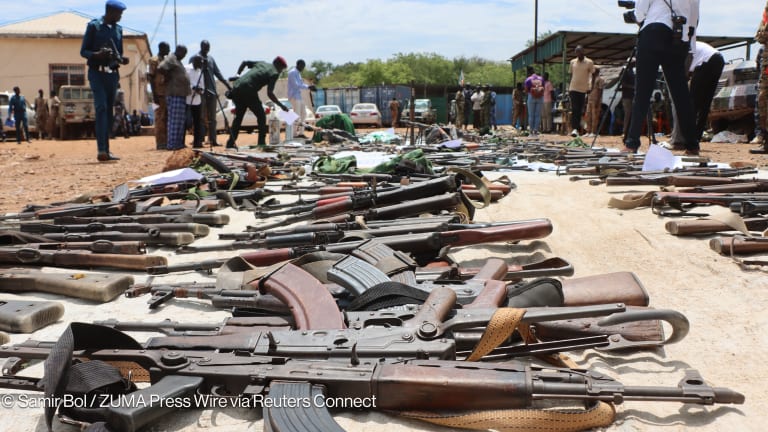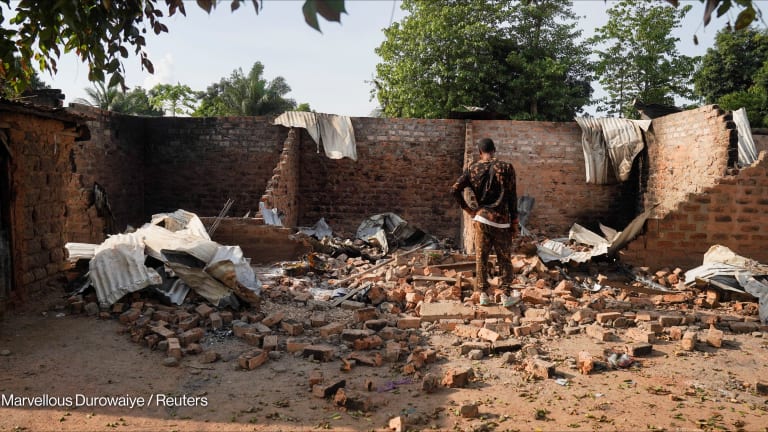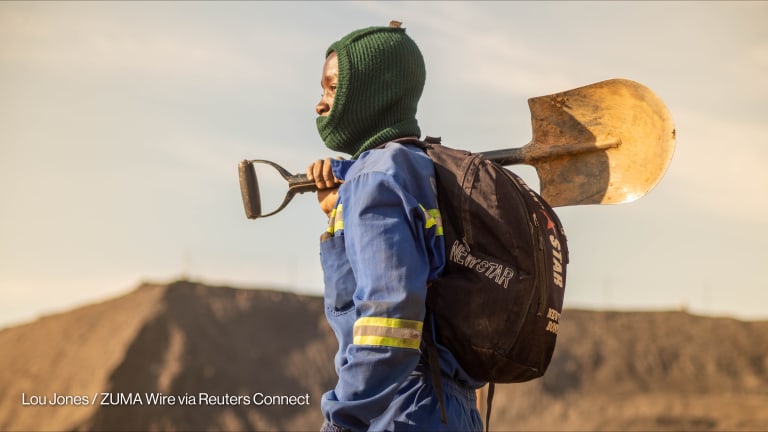
OUAGADOUGOU, Burkina Faso — Escalating violence and the rapid spread of the new coronavirus in Burkina Faso have created a challenging operating environment for aid workers. Some humanitarians say the situation has been compounded by the ambiguity surrounding the legal status of the country’s conflict.
The West African nation was largely spared the violence that plagued its Malian and Nigerien neighbors, but that has changed in recent years as attacks have increased across the country. Almost 1,000 civilians were killed in 2019 by local militias and fighters linked to Islamic militants — an increase in attacks of almost 190%, according to the Armed Conflict Location & Event Data Project. Nearly 840,000 people have been internally displaced — for the majority, this occurred in 2019 — creating one of the world’s fastest-growing displacement crises.
In Burkina Faso, aid groups face a test of the ‘humanitarian-development nexus’
Mounting violence in Burkina Faso has forced groups to shift operations from a development to a humanitarian focus — a process made even more complicated by COVID-19, aid workers tell Devex.
The government of Burkina Faso has not officially classified the violence as an armed conflict, according to someone who has close knowledge of the military but was not authorized to speak on the record. When violence is not considered an armed conflict, armed groups have different legal obligations than they would under international humanitarian law, or IHL, which regulates conduct in conflicts. And these rules of war have varying implications for aid workers on the ground, as well.
In Burkina Faso, the escalating crisis has warranted “the stepping up of the applicability of IHL,” Laurent Saugy, head of the International Committee of the Red Cross in the country, told Devex in April. Saugy confirmed that, according to ICRC’s analysis, there is a conflict situation involving a group affiliated with the Islamic State group and another affiliated with al-Qaida in the country.
Some aid groups in Burkina Faso said that officially defining the context as an armed conflict would make it easier to deliver aid to vulnerable populations, since the classification would include ground rules for armed groups and protections for civilians.
“Humanitarians are in a difficult situation, as every attack in Burkina Faso is attributed to terrorists,” said Manenji Mangundu, country director for the Norwegian Refugee Council in Burkina Faso and Niger.
There is no recognition of any nonmilitary groups, which makes it hard to negotiate access, he said. If the situation were more defined, aid groups could speak in one voice and make it clear that they were acting as neutral, independent parties, he said.
Why IHL matters
International humanitarian law provides a set of obligations to protect those who are not participating directly in the hostilities.
“Wars have limits and rules, and the distinction between what can be a military target and what is not is a key principle of IHL, as well as precaution and proportionality,” Saugy said.
Having a clear framework and being able to refer to the laws of armed conflict result in better protection and access to assistance for thousands of people affected by the violence, he said.
When IHL is not respected, human suffering increases and the consequences of the conflict become more difficult to repair, according to a report by ICRC.
For a situation to be classified as an “armed conflict involving armed groups,” two criteria must be met, said Annyssa Bellal, senior research fellow and strategic adviser on international humanitarian law at the Geneva Academy of International Humanitarian Law and Human Rights.
“Humanitarians are in a difficult situation, as every attack in Burkina Faso is attributed to terrorists.”
— Manenji Mangundu, Burkina Faso and Niger country director, Norwegian Refugee CouncilNonstate armed groups must reach a minimum degree of organization to be able to respect IHL, and there must be protracted violence between armed groups and government forces or between armed groups themselves.
While militants do not always claim attacks in Burkina Faso, analysts and aid groups have a fairly clear idea of who is operating where.
One of the two main extremist groups active in the country is the Group for the Support of Islam and Muslims, which is mainly operational in Soum province in the Sahel region and along the western border. The other is the Islamic State in the Greater Sahara, which has a presence in the Sahel’s Oudalan province, is gaining ground in the North, and has a foothold in the East. Both groups, however, share spaces in multiple parts of the country.
Some aid groups in Burkina Faso have been pushing for armed-conflict classification, particularly to make access negotiations easier.
“It’s one of the key things affecting us,” said an aid worker who asked to remain anonymous to protect his safety. Armed-conflict classification would give aid groups leeway to negotiate with defined parties, he said.
Currently, there is significant ambiguity among Burkina Faso’s aid community as to whether organizations can negotiate with nonstate armed groups. Many organizations are under the impression that it is illegal.
Some organizations point to a revised version of the country’s penal code, which states that it is a criminal offense to “intentionally communicate, publish, divulge or relay, by any means of communication, false information of a kind to suggest that a destruction, degradation or deterioration of property or an attack against persons has been committed or will be committed,” as the reason why they cannot negotiate.
While the article does not say anything about negotiations, it is being interpreted by some as prohibiting any communication with armed groups. As a result, many humanitarians have refrained from negotiating access in areas without a strong government presence, which in some cases has impeded their ability to deliver aid.
Even if there were more clarity about whether they were allowed to negotiate, several aid workers told Devex they are not sure whom to negotiate with, as some of the groups are elusive.
Devex reached out to Burkina Faso’s military and government spokespeople to clarify whether humanitarians are allowed to negotiate with armed groups but received no response.
The impact on aid groups
While classifying fighting as an armed conflict provides protections for civilians by clearly distinguishing military and nonmilitary targets, there are reasons why governments and armed groups might oppose such a classification, said Bellal, the strategic adviser on international humanitarian law.
When IHL applies, nonstate armed groups have the right to target military bases, vehicles, or enemy soldiers, and this is where governments sometimes push back, she said.
“Under IHL, armed groups which target military objectives do not violate the law, and such targeting, provided other conditions of proportionality and precautions are met, do not constitute war crimes,” she said.
Humanitarians operating under IHL can offer assistance to vulnerable populations with government consent. If the government cannot provide help itself, it cannot refuse aid organizations access, she said.
For example, in camps for internally displaced people, where occupants often live in unsanitary conditions with no medical access, aid groups can suggest establishing hospitals; if the government cannot provide assistance, such as hospitals or adequate aid, then it cannot refuse humanitarian access.
But under IHL, parties to the conflict can also be exempt from responsibility if aid workers or civilians are deemed collateral damage. If a clinic where aid workers are operating is next to a military target and is struck, parties might not be held accountable if they can prove that it was not a targeted attack.
With the added complication of COVID-19 across Burkina Faso and other fragile states, ICRC is urging that key provisions of IHL are respected to ensure people remain protected, specifically with regard to those who are internally displaced, refugees, asylum-seekers, humanitarians, and detainees.








